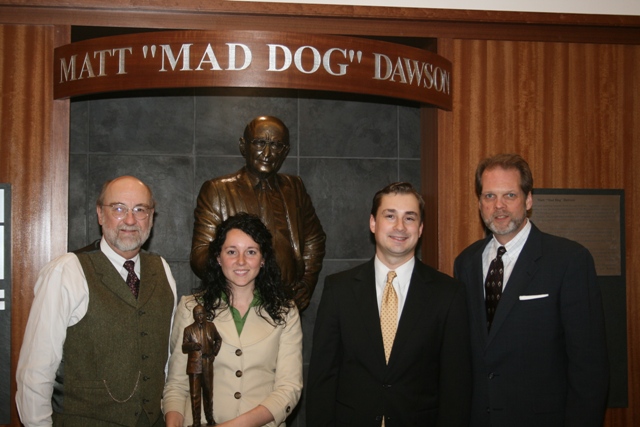Kacey VanDeaver Named Baylor Law's Newest 'Top Gun'

(L to R) - Baylor Law Professor Gerald Powell; Kacey VanDeaver, named "Top Gun" as winning the intrascholastic Bob and Karen Wortham mini-trial competition; Ben Yelverton , finalists in the competition; and Baylor Law Professor Jim Wren.
Follow us on Twitter: @BaylorUMedia
Third-year law student Kacey VanDeaver was named Baylor Law School's newest "Top Gun" on Dec. 5, after winning the intrascholastic Bob and Karen Wortham mini-trial competition.
VanDeaver took home the "Mad Dog," an 18-inch bronze statuette of Matt "Mad Dog" Dawson, the legendary Baylor Law professor who started the tradition of mini-trial competitions during his tenure as director of Baylor Law's Practice Court Program.
VanDeaver battled fellow third-year Ben Yelverton for three hours to win the coveted trophy and the title of the top Baylor Law student trial advocate. As winner of the Wortham competition, VanDeaver received $3,000. As runner up, Yelverton received $1,000. Semifinalists were Kyle Counce and Trey Duck, who received $500 each.
"I was very surprised (when the winner was announced)," VanDeaver said. "There were no easy rounds throughout the competition, and I am honored to be in a class with so many great advocates. I believe that if we did the competition over a dozen more times, there could be a dozen different winners."
Participants in the preliminary rounds and semifinals tried a negligence case, but the finalists learned on Friday that they would receive an entirely new case for the finals. In the finals, VanDeaver and Yelverton tried a fictional civil case regarding a topic much in the news. Chase v. Steelton Pit Bull Hockey Club Inc. focused on a semiprofessional hockey player alleging negligence against his team for not diagnosing him with a concussion during a game, which caused him permanent harm when he suffered a second concussion. The hockey club counter-sued the player for negligence for not revealing his symptoms. VanDeaver represented the plaintiff.
"Working solo provided its challenges. I wasn't able to bounce ideas off anyone. It was stressful to know that I would test my theories for the first time in front of the jury," VanDeaver said.
"The challenges of the competition were all about adaptability," Yelverton said. "You have to be able to focus, to be creative and to adapt to very different styles and strategies literally from day to day, with virtually no prep time between rounds. Of course, when we were given an entirely new problem on Friday that pushed us even further to adjust on the fly."
VanDeaver and Yelverton were judged by experienced trial lawyers and adjunct professors Ben Selman and Vik Deivanayagam. Attorney Greg White served as presiding judge. The three offered valuable advice to the finalists.
"The judges reminded me to give the jury a strong moral reason to vote in my favor but to back the moral justification with a solid piece of evidence," VanDeaver said.
A native of Bogata, Texas, VanDeaver graduated from Texas A&M University with a degree in agricultural economics. She has served on the Student Bar Association and competed in the Adoption Law and Child Welfare Moot Court Competition and the Lone Star Mock Trial Competition.
Yelverton is a native of Orange, Texas, and received a bachelor's degree in political science from the University of Texas at Dallas. In law school he has been a member of the Wechsler First Amendment Moot Court team, The AAJ mock trial team and the NCTC mock trial team.
The Honorable Bob and Karen Wortham sponsor the intrascholastic competition. Wortham, now judge of 58th District Court in Jefferson County, served 12 years as U.S. attorney for the Eastern District of Texas before becoming a partner in the Reaud, Morgan and Quinn Law Firm. He began his career as a Jefferson County assistant district attorney and, at age 31, was appointed to serve an unexpired term as judge of 60th District Court, becoming the youngest district judge in the state. In 1993, he received the Department of Justice Award for Outstanding Service. The couple's son, Baylor, also is an alumnus of the school and, following in his father's footsteps, works at the District Attorney's Office in Jefferson County.
About Baylor
Baylor University is a private Christian university and a nationally ranked research institution, characterized as having "high research activity" by the Carnegie Foundation for the Advancement of Teaching. The university provides a vibrant campus community for approximately 15,000 students by blending interdisciplinary research with an international reputation for educational excellence and a faculty commitment to teaching and scholarship. Chartered in 1845 by the Republic of Texas through the efforts of Baptist pioneers, Baylor is the oldest continually operating university in Texas. Located in Waco, Baylor welcomes students from all 50 states and more than 80 countries to study a broad range of degrees among its 11 nationally recognized academic divisions.
About Baylor Law School
Established in 1849, Baylor Law School was the first law school in Texas and one of the first west of the Mississippi River. Today, the school has more than 7,000 living alumni. It is accredited by the American Bar Association and is a member of the Association of American Law Schools. Baylor Law School has a record of producing outstanding lawyers, many of whom decide on a career in public service. The Law School boasts two Texas governors, members or former members of the U.S. Congress and U.S. Senate, two former directors of the FBI, ambassadors, federal judges, justices of the Texas Supreme Court and members of the Texas Legislature among its notable alumni. In its law specialties rankings, U.S.News & World Report ranked Baylor Law's trial advocacy program as the third best in the nation. Baylor Law School is ranked No. 56 in the magazine's 2012 edition of "America's Best Graduate Schools."
Media contact: Lori Fogleman, director of media communications, (254) 710-6275